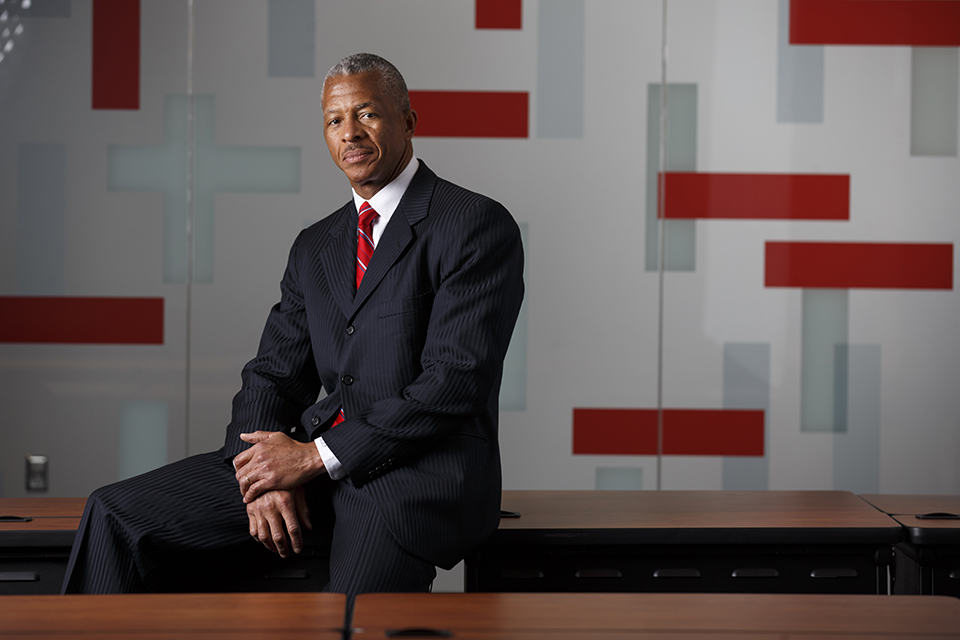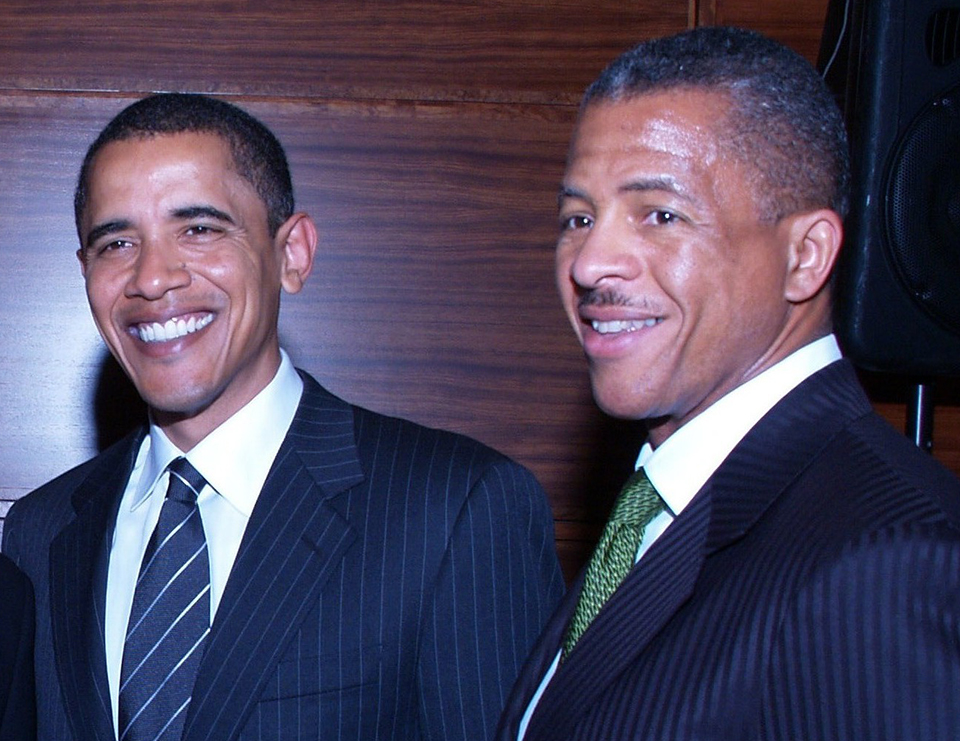CSUN Distinguished Alumnus Robert D. Taylor Impacts Industry, His Community and His City
The encyclopedia salesman knocked on the door, and Geneva Williams answered. He gave his pitch, and then Geneva looked to her 8-year-old son, Robert D. Taylor, for advice.
Not a good investment, the little boy told his mother. But for some reason, she decided to go through with the purchase, despite being cash-strapped.
At some point soon after, Taylor decided what he would become when he grew up — a scientist. So, he looked it up in the new encyclopedia, and it prompted him to keep digging until he read about engineering.
“At that age, I knew I wanted to be an engineer,” Taylor said.
Forty-five years later, Taylor insists that at age 8, he made his life plan: earn an engineering degree, go to law school, create jobs and opportunities for African-Americans and make a difference in society. He met all of those aims. And something he didn’t plan or ask for happened on April 16: California State University, Northridge honored Taylor with one of the university’s highest accolades — a Distinguished Alumni Award.
Taylor ’82 (Engineering) admitted being slightly uncomfortable with the honor. He often uses the example of Capt. Chesley Sullenberger, who safely landed a disabled plane carrying 155 people on the Hudson River in New York in 2009. Sullenberger struggled with the word “hero” and said on many occasions that the safe landing was simply the result of a job done well.
“I have lived my life the way I think my mother would be proud, the way that Captain Sullenberger recommended,” Taylor said. “He inspired me to continue to labor without concern about whether or not anybody notices. That’s what I [have said] to my team: ‘The most important thing is what we do when no one will notice.’”
Taylor is one of the most impactful African-American financial industry leaders in California. He is a private equity investor and partner at holding company 3.5.7.11. Taylor began his career at McKinsey & Company, one of the world’s most-recognized management consulting firms, where he helped improve the performance of large, complex for-profit and nonprofit enterprises. He also has been a difference maker in the community, serving as an instrumental figure in the rebuilding of Los Angeles after the 1992 riots and as a leader in the National Urban League and Los Angeles Urban League (LAUL). He also has served on the CSUN Foundation board and the CSUN Task Force on Engagement.
Taylor’s Mission
Taylor’s connection with CSUN began when he was drawn to the school’s engineering program. Professor and later Dean of the College of Engineering and Computer Science Raymond Landis founded the Minority Engineering Program at CSUN — the first such program in the state. Landis and the program’s associate director, Rick Ainsworth, became mentors to Taylor and helped support his work.
“Right from the beginning, he was a standout,” Landis said. “It was almost like he didn’t need the program, the program needed him. He was such an outstanding young man — bright, motivated, caring. He set an example and was a role model for others.”
After earning his degree in engineering from CSUN, Taylor went to Stanford, where he earned an MBA and a law degree. That led him to McKinsey, where he quickly climbed the ladder.
His teams’ work often featured pioneering solutions to pivotal business challenges ranging from broad-based, physician-led innovation in the practice and management of medicine, to re-engineering the investigation and resolution of property casualty claims. In the process, Taylor rose to become the firm’s only black partner.
Charles Schetter, a former senior partner at McKinsey, began working with Taylor in 1986, shortly after Taylor graduated from Stanford Law School. He said Taylor was the glue of the company.
“I entrusted to Robert the people processes for the several hundred people we had in the practice,” Schetter said. “Robert is a man of great empathy and an inspiring leader, and he is the person I wanted to be in charge of the care and feeding of our people.”
Schetter also called Taylor a crusader. In 1992, in the aftermath of the Los Angeles/Rodney King riots that ravaged the inner city, Taylor told people close to him — Schetter and his wife, Joy, primarily — that he felt a calling to help. Mayor Tom Bradley started the Rebuild L.A. initiative and placed 1984 Time Magazine Man of the Year and former Major League Baseball Commissioner Peter Ueberroth in charge of the effort. Taylor reached out and offered his assistance.
“I reached out to all kinds of communities. We needed thousands of people to help us, but we needed some really key leaders — and Robert was one of the first to step forward,” Ueberroth said. “He showed a calmness and a skillset that was very unusual, and it was key to our success.”
McKinsey volunteered early on to help organize the rebuilding effort, with Taylor playing a significant leadership role.
“He was not afraid,” Ueberroth said. “It’s a nasty assignment. He wasn’t looking to be a hero. He wasn’t looking to be in the newspapers. He was working to make the city better. He knew as a citizen, he’d make the city better. … It was totally unselfish. It was a case where he wanted to give back. Not a lot of people do that, but those were the kinds of people we attracted, and he was a superstar.”
It was through Taylor’s work with Rebuild L.A. that he caught the eye of the National Urban League.
Taylor became a longtime volunteer for the Urban League, whose mission is to enable African-Americans to secure economic self-reliance, parity, power and civil rights.
On two occasions, Taylor led the effort to fundamentally reset the Urban League’s strategy, as well as assisting with the design and execution of key programs and chairing several board committees during his tenure. The highlight of Taylor’s service was being entrusted with the position of senior vice chair (the most senior volunteer role) from 2005-12.
“[Taylor] possesses a really strong passion and commitment and compassion for making a difference in this community and beyond this community,” said civic leader and former LAUL president John Mack. “[He applied] his knowledge, his expertise for creating a level playing field for people of color … to educate their children, to live in a safe community and provide for them … and narrow the gap of the inequities. He really has a passion in that regard. It wasn’t just about doing his professional thing. There was the compassion, the human spirit that Robert possessed and brought to the table.”
Creating Opportunity
Taylor did all that while maintaining a strong passion for his professional work. His objective from an early age was to become an entrepreneur and bring his skills and resources back to his community to create opportunities. He has done that at many steps along the path.
Taylor co-founded two private equity firms, including Centinela Capital Partners, LLC. That firm has backed 46 new and emerging investment teams who have created an estimated $5 billion in value and unprecedented levels of diversity among their general partners, according to Taylor.
CSUN recognized how vital Taylor has been to his field and his community. On the night he received the Distinguished Alumni Award, Taylor seemed to find more comfort in accepting the honor and expressed excitement.
When he got on stage, Taylor thanked his wife and children, CSUN mentors Landis and Ainsworth, friends and colleagues, his alma mater, and most importantly he reflected on what his mother did for him.
“I’ve had help and guidance from a lot of people,” he said. “Mom, through her sacrifice.”
Then, Taylor shared her advice to him:
“Work hard. Be graceful. Believe in yourself. Stick together. Don’t complain. Don’t quit. And don’t embarrass me by wasting the sacrifice I made for you.”



 experience
experience